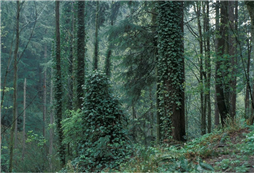May is Invasive Plant Month
City raising awareness of invasive plants and their effects
NEWS RELEASE - Distributed April 25, 2014 10:00 AM
Summary
May is Invasive Plant Month in the City of Nanaimo. This is the second year the City has held this special month to raise awareness of invasive plants and their effects on our parks.
Invasives are plants that have the potential to impact local ecosystems in a negative way. Plants, such as English Ivy, Scotch Broom and Himalayan Blackberry are well established in Nanaimo while others, such as Knotweed, Daphne and Giant Hogweed are just starting to make their way into the area. All invasive plants suppress many of the local native plants which in turn reduces the biodiversity found in our City.
This year, our focus will be on English Ivy and the importance of removing it from trees throughout the community.
Invasive Plant Month kicks off on April 27, during the Earth Day celebrations at Bowen Park, where the public is invited to attend our ivy removal and disposal demonstrations, from 1pm to 3pm.
Link to Strategic Plan: Invasive species control falls under Environmental Responsibility, one the four Pillars of Sustainability in the City of Nanaimo's Strategic Plan.
Key Points
- Other events include a Broombusters work party at Nanaimo Ice Centre on May 10, invasive plant removal at Pioneer Waterfront Park on May 28 and English Ivy work party at Bowen Park on May 31.
- Residents can drop off invasive plants they have removed from their property at the Wall Street entrance of Bowen Park from 12:00 pm to 3:00 pm on May 31.
- English Ivy spreads out over the forest floor, shading and smothering plants underneath it. In its adult stage ivy wraps itself around trees and can topple them in wind storms due to its heavy weight.
Quotes
"Invasive plants negatively impact the natural diversity in our parks. Invasive Plant Month is meant to raise awareness of these plants and help residents identify them to stop their spread."
Quick Facts
- Improper disposal of garden waste in our parks increases the likelihood of spreading invasive plants. Residents can dispose of garden waste at the regional landfill (1105 Cedar Road) or compost it.
- English Ivy has a juvenile stage where it grows as a vine along the ground and an adult stage where it forms thick woody stems and grows up into trees causing significant environmental damage.
- Some invasive plants, like Giant Hogweed, are toxic to humans and animals.
- Biodiversity is the variety of plants, animals and other living things in a particular habitat or ecosystem.
Images
Contact:
Print News Release
-
Parks, Rec & Culture
- Recreation Facilities & Schedules
- Parks & Trails
- Trails
- Activity Guide
- Events
- Register for a Program
- Drop-In Schedules
- Public Art
- Culture
- Poetry
-
City Services
- Garbage & Recycling
- Home & Property
- Water & Sewage
- Online Services
- Cemetery Services
- City Services Directory
-
Property & Development
- Urban Forestry
-
Building Permits
- Online Building Permit Application
- Building Permit Revision
-
Application for a Residential Building Permit
- Access (driveway) Permit
- Accessory Building Permit
- Alteration Permit
- Building Envelope Repair
- Carriage House
- Demolition Permit
- Fence or Retaining Wall Permit
- Geotechnical Reports
- Locate Permit
- New Construction Permit
- Plumbing or Services Permit
- Secondary Suite Permit
- Special Inspection Permit
- Swimming Pool Permit
- Woodstove Installation Info
- Green Home Initiatives
- Building Three/Four Dwelling Units
-
Apply for a Commercial Building Permit
- Access (driveway) Permit
- Commercial Alteration Permit
- Building Envelope Repair Permit
- Demolition Permit
- Fence or Retaining Wall Permit
- Geotechnical Reports
- Leasehold Improvement
- Locate Permit
- New Commercial Construction Permit
- Occupant Load Permit
- Signs Permit
- Special Inspection Permit
- Sprinkler Requirements
- Fees and Bonding
- Commercial Plumbing Permit
- Certified Professional Program
- Bylaws for Building
- Forms and Guidelines
- Book a Building Inspection
- Report Illegal Construction
- Request Building Plans
- Building Permit Statistics
- Permit Fee Calculator
- Building News and Alerts
- Fast Track Building Permits
- Development Information
- What's Building in my Neighbourhood
- Development Activity Map
- Community Planning
- NanaimoMap
- Rebates
- Engineering Survey
- Land Use Bylaws
- Soil Removal and Depositing
- Heritage Buildings
- Sustainability
- Transportation & Mobility
-
Your Government
- Get Involved
- Government Services Guide
- News & Events
-
City Council
- Advocacy
- Contact Mayor & Council
- Council Meetings
-
Boards & Committees
- Advisory Committee on Accessibility and Inclusiveness
- Board of Variance
- Design Advisory Panel
- Finance and Audit Committee
- Governance and Priorities Committee
- Mayor's Leaders' Table
- Parcel Tax Roll Review Panel
- Special District 68 Sports Field and Recreation Committee
- Public Safety Committee
- Understanding Council Committee Structures
- Council Policies
- Mayor's Office
- Council Initiatives
- Proclamations
- Bastion Lighting Requests
- Alternative Approval Process
- Budget & Finance
- Records, Information & Privacy
- Elections
- Contacts
- Careers
- Maps & Data
- Projects
- Tourism Nanaimo
- Grants
- Awards
- Accessibility & Inclusion
-
Doing Business
- Economic Development
- Doing Business with the City
- Business Licences
- Filming in Nanaimo
- City Owned Property
- Encroachments onto City Property
- Liquor Licences
- Cannabis Retail
- Business Improvement Areas
- Procurement Services
- About Nanaimo
- Green Initiatives
-
Public Safety
- Social Development
- Public Safety Contacts
- Nanaimo Fire Rescue
- Emergency Management
- Police & Crime Prevention
- City Bylaws
- Community Safety and Wellbeing
- Emergency Services


